Knowledge & Innovation Sessions - 14.10 to 15.10
In the afternoon session, delegates were treated to a choice of 11 different sessions. The menu on offer included:
1. Recruitment and Training to Support Inspirational ExtraCare Communities (opens new window)
Led by Heidi Cokayne, Personnel Team Leader; Dave Edwards, St Oswald's Village Resident; Ivan Finney, Training and Development Manager; Maureen Hobbs, Shenley Wood Village Resident, The ExtraCare Charitable Trust.

2. Innovations: Life changing "technology-enabled housing with care" (opens new window)
Matthew Warnes, CEO, Adaptive Technology (Europe) Limited and Simon Herdsfield, Head of Wellbeing & Support, Herefordshire Housing
This session, supported by Tunstall Healthcare was in two parts and covered:
Better for disability - How to develop, design and deliver life changing "technology enabled housing care" How to develop, design and deliver life changing "technology enabled housing care"
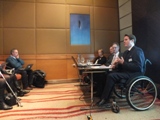
- What do we do / the "better for disability" vision
- Challenges in the learning/physical disabilities housing sector
- Why is change needed?
- How technology is delivering outcomes - personal, financial, system
- Future gazing
Better for dementia - Enhanced Living, utilising technology to support life skills, reablement, lifetime care and independent living.
This session set out how Herefordshire Housing won the Telecare Services Association's Crystal Award for Technology Enabled 21st Century Care and Support
- Their aims and objectives - Providing care and support under one roof; Preventing deterioration of health conditions; High quality supported housing; Avoiding hospitalisation
- How technology has made a difference for residents and our business
3. Understanding the Housing with Care Market (opens new window)
Mel Knight, Chief Executive, Castleoak and Michael Voges, Executive Director, Associated Retirement Community Operators (ARCO)
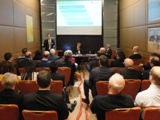
4. How are the challenges and opportunities of dementia shaping our housing and care offer? (opens new window)
Joy Sumner, Day Care Manager, Housing & Care 21; Lisa Birchall, Business Research Analyst, Housing & Care 21; Vanessa Pritchard-Wilkes, External Affairs Manager, Housing & Care 21
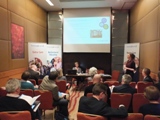
5. Specialist Housing: Diverging Business Models (opens new window)
Anne-Marie Nicholson, Partner, PRP and Jenny Buterchi, Director, PRP Architects

6. SCAPE - the effective and sustainable route to procurement for the Public sector (opens new window)
Sophia Lawrie, Framework Manager, WDH and Stephen Corbett, Care Sector specialist, WDH

7. Innovate for Creativity (opens new window)
Denise Brennan, Head of Strategy and Policy, Guinness Care and Support; Helen Webb, Customer and Community Engagement Manager, Guinness Care and Support; Tim Rabone, Policy and Research Manager, Guinness Care and Support
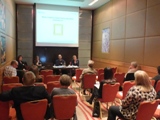
8. Are housing associations ready for an ageing population?
no slides were used during this session
Charlotte Cook, Partner, Winckworth Sherwood and Siobhan Pierce, Head of Operations (East), Genesis Housing Association
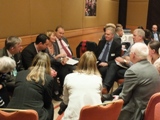
How will this impact on housing associations - both as the housers of those who will become that older generation, and as (to date) one of the main providers of supported and specialised housing. Are housing associations geared up and ready for these changes - and indeed do they know what those are? And can they start to inform public policy in this arena?
Click here (opens new window) to access a report by The Smith Institute, commissioned by Genesis Housing Association on the subject
Click here (opens new window) to access another presentation on the subject, given by Martin Wheatley, Visiting Fellow, The Smith Institute at the East of England regional Housing LIN meeting in December 2014
9. Understanding ageing research for age-friendly urban practitioners (opens new window)
Anne Dye, RIBA Head of Technical Research; Alex Tait, RIBA Research Projects Officer; and Sophie Handler, Age-Friendly Manchester, RIBA Research and Innovation Group member

10. The Housing and Dementia Research Consortium: promoting dementia friendly design (opens new window)
Dr Simon Evans, Principal Research Fellow and Head of Research, Association for Dementia Studies, University of Worcester; Sarah Waller CBE, Programme Director, Enhancing the Healing Environment (EHE), The Kings Fund; Dr Julie Barrett, Research Coordinator, Housing and Dementia Research Consortium (HDRC).
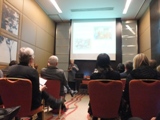
11. Housing for Independent Living: Developing a strategy that meets older people's aspirations (opens new window)
Imogen Blood, Imogen Blood and Associates and Dan Gaul, East of England Lead, Housing LIN
The workshop considered the benefits of both quantitative and qualitative analysis to develop older people's housing strategies. Older people's housing needs and expectations are reviewed through a recent Housing LIN project in Bolton. The project met with over 170 older people to consider their future needs and reviews the difference in priorities between older people and the council's public sector partners. The attitudes and aspirations of self funders/owner occupiers are explored to achieve a holistic approach to strategy development to meet the requirements of the Care Act.
Future needs were predicted through the Housing LIN and EAC's SHOP@ analysis tool (opens new window).
